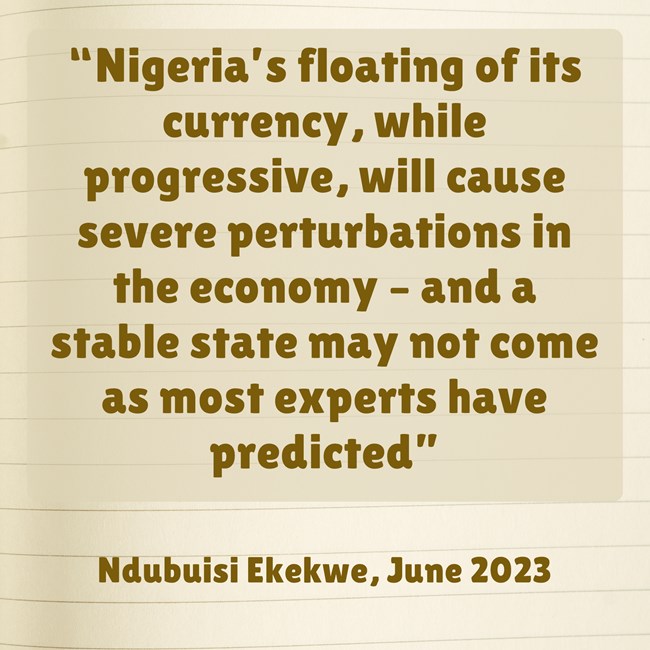
1. Nigeria floats its currency.
My response: “Nigeria’s floating of its currency, while progressive, will cause severe perturbations in the economy – and a stable state may not come as most experts have predicted” – Ndubuisi Ekekwe, June 2023
2. JP Morgan projects that Naira will settle at N600/$ post-float.
Register for Tekedia Mini-MBA edition 19 (Feb 9 – May 2, 2026): big discounts for early bird.
Tekedia AI in Business Masterclass opens registrations.
Join Tekedia Capital Syndicate and co-invest in great global startups.
Register for Tekedia AI Lab: From Technical Design to Deployment (next edition begins Jan 24 2026).
My response: ‘“My perspective: I think JP Morgan may need to review. Whether you float, swim or fly Naira, Naira can only survive if the economy is productive with capacity to produce things (digital, physical, service, etc) to reposition the nation’s balance of payment and trade.”’ – Ndubuisi Ekekwe, June 2023
Can these people pay attention to village boys and girls as they work to fix Naira which has hit an excess of N1400/$? We were lone dissenters to the broad general positive consensus on Naira floating. Of course, I would be happier if We The People here were wrong! Do they read us? Village boys and girls do have things to contribute!
1. Nigeria floats its currency.
My response: “Nigeria’s floating of its currency, while progressive, will cause severe perturbations in the economy – and a stable state may not come as most experts have predicted” – Ndubuisi Ekekwe, June 2023 https://t.co/fwEmi2DQhf2. JP Morgan… pic.twitter.com/vkQNI4gQ0D
— Ndubuisi Ekekwe (@ndekekwe) January 31, 2024
Comment on Feed:
Comment 1: Our country is in need of a major reset, if we can’t earn USD to sustain our dependence on the consumption of foreign goods and services and we can’t switch to the consumption of locally available goods and services, let the naira remain floating to help us with the difficult but necessary reset.
In my view, no policy has exposed the failure of the Nigerian elites more than the policy on the floating of the naira. We need to start the unavoidable shift to the local transformation of locally available resources to create the goods and services for local consumption and export. We need to start growing cotton and start converting same to the textile that we need without any excuses. We need to sustain the refining of our crude oil to start producing the petrol and diesel that we use.
If we can’t grow wheat, we need to start baking and consuming Cassava bread.
The Nigerian elites must take the lead in the redesign of the Nigerian economy.
Let the naira remain floating to help us with making that critical but necessary mindset switch.
According to Newton’s law of inertia, the condition that we have been accustomed to for decades will not change without a force, that force is the floating of the naira.
Let the naira keep floating.
My Response: The irony is that you could have done all those without the float! We need to understand that even China does not float the Yuan for an opposite reason (if it floats, the currency will become stronger which it does not want since it is export-dependent). What China does is to artificially track the US dollars and with the funds it has, and it achieves that.
Unless you are fully advanced with “international currencies” like the USD, UK, Euro, Yen, etc, OR you generate so much foreign reserves like rubles (Russia before war) floating is very risky. In Saudi Arabia, for decades, they did not bother: they pegged their currency to USD dollar, no float.
Floating had limited values for most countries. The biggest risk in such economies is not the variation between official and black market rates, but the instability in the exchange rate. I earned a doctoral degree in this space with focus on international markets and global currency as a banker. I played a core role pushing the African Union out of a single currency a decade ago in many lead papers https://base.afrique-gouvernance.net/docs/volume_21.pdf . If you look at the data, what Nigeria did was not smart on this floating.
---
Connect via my
LinkedIn |
Facebook |
X |
TikTok |
Instagram |
YouTube



